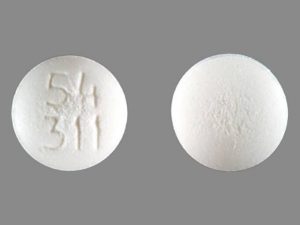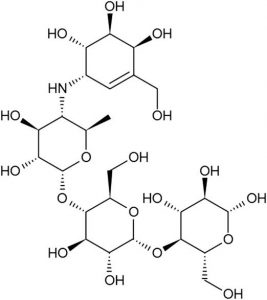Description of Acarbose Tablet
Acarbose tablet, an alpha glucosidase inhibitor is an oral anti-diabetic agent. It comes in different strength which includes 25mg, 50mg and 100 mg.

Pharmacology
Acarbose is a competitive inhibitor of intestinal alpha-glucosidases with maximum specific inhibitory activity against sucrase. The digestion of starch and sucrose into absorbable monosaccharides in the small intestine is delayed and this results in a lowering of postprandial hyperglycaemia and a smoothing effect on fluctuations in the daily blood glucose profile. Unlike sulphonylureas acarbose has no stimulatory action on the pancreas. It also reduces fasting blood glucose and has a modest effect on the HA1C
Following oral administration, only 1-2% of acarbose is absorbed; the bulk of it is eliminated in the faeces.
Uses or Indications of Acarbose
It is used as an adjunctive therapy in the management of type 2 diabetes in combination with diet and exercise, with or without other oral hypoglycaemic agents or insulin.
Administration: How to Take Acarbose
Patient should swallow the tablet whole with a little liquid directly before the meal, or chew with the first mouthful of food.
It is taken by mouth. Starting dose is 50 mg 1-2 times daily; increased to 3 times daily depending on response and tolerance. If no response after 6-8 weeks, the dose may be increased to a its maximum which is 100-200 mg 3 times daily.
Owing to the great individual variation of glucosidase activity in the intestinal mucosa, there is no fixed dosage regimen, and patients should be treated according to clinical response and tolerance of intestinal side-effects. A gradual dose escalation is favoured to minimise Gl side effects.
Contraindications
- Acarbose is contraindicated in patients who are hypersensitivity to acarbose or any of excipients used in its formulation.
- It is also contraindicated in Pregnancy and lactation.
- Disease conditions where acarbose is contraindicated include the following: Inflammatory bowel disease, colonic ulceration, partial intestinal obstruction or predisposition to intestinal obstruction; Chronic intestinal diseases associated with marked disorders of digestion or absorption; Conditions which may deteriorate as a result of increased gas formation in the intestine, e.g. larger hernias.
- It is also contraindicated in hepatic impairment; and in severe renal impairment.
- Children below 18 years of age should not take it
Precautions
- Acarbose may potentiate the hypoglycaemic effects of insulin and sulphonylurea drugs. Monitor closing for this effect if it is to be used with them or any other antiiabetic drug.
- It delays digestion and absorption of disaccharides e.g. sucrose (patients should use glucose for hypoglycaemia).
- Monitor liver enzymes during the first 6-12 months of therapy; discontinue if transaminases are elevated.
Interactions of Acarbose with Drugs
- Intestinal adsorbents (e.g. charcoal) and digestive enzyme preparations (e.g. amylase, pancreatin) may reduce its effect.
- Cholestyramine may enhance its postprandial insulin reducing effect. Sucrose containing foods may increase abdominal discomfort
Side Effects
The common side effects associated with acarbose usage include flatulence, diarrhoea, abdominal pains, nausea, vomiting, dyspepsia, increase in liver enzymes.
How to Store
Store it in a cool, dry place and away from direct sunlight. Keep away from the reach of children.
Chemical Structure

